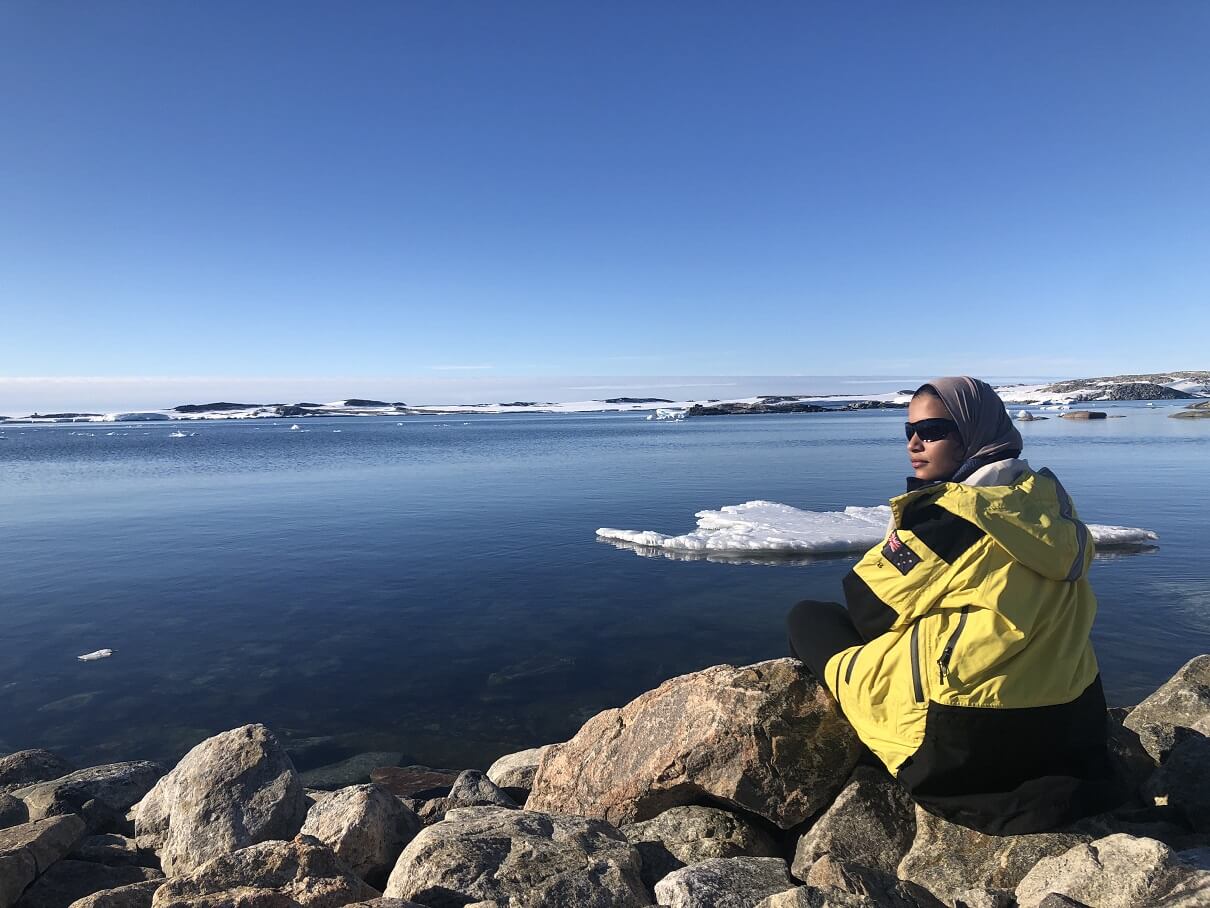
Set to Graduate in Fall 2019, Tawaddod Alkindi Weathers Icy Conditions to be Part of First Solar Panel System Installation near Antarctic Circle
A Khalifa University Material Science and Engineering Graduate, Tawaddod Alkindi, has become the first student to complete her internship at the Casey research station that is part of the Australian Antarctic station, located on Vincennes Bay in the Windmill Islands, just outside the Antarctic Circle.
Alkindi had the opportunity to participate in the installation of 105 solar panels and three inverters that is expected to provide 30 KiloWatts of power to the Casey research station’s power grid, which is the first solar power array at an Australian Antarctic research station. The array will help reduce the consumption and storage costs of diesel fuel during the summer month when the location receives nearly eight hours sunshine per day. The Casey research station opened in 1988 to support scientific programs in Antarctica.
A large number of scientific programs are supported in and around Casey, including an international collaboration project studying the bedrock geology and overlying East Antarctic ice sheet. The project partners include Khalifa University of Science and Technology, the Australian government and Abu Dhabi Future Energy Company (Masdar). The project aims to enhance scientific understanding of the effects of global warming and climate change on the polar continent.
Alkindi said: “It was great to see the team at the station actively implementing solutions to address global climate change and environmental issues, and more importantly they are working in remote and not-so-remote locations to implement innovative solutions.”
Her internship days were filled with visits to various sections of the research station. She added: “On some days, I would visit mechanical workshops, maintenance facilities, water purification facility, remediation site, powerhouse, survival tools store, and the solar power system. But during inclement weather conditions, I would tour inside the accommodation building, where I learned about the heating/cooling systems.”
Alkindi believes it was an enriching experience as one could always meet someone from a different culture, especially during the meals. She found this time very good for sharing with others the culture of the UAE and the government’s commitment to empower Emirati youth and support women in all fields.
She said: “Meal time was my favorite because I had the pleasure to talk to different people from other cultures. It was also inspiring to hear the dreams and experience of each person I met, and get myself transported to a different part of the world.”
Her learning about the Antarctic weather continued when she participated in an outdoor survival training and learned navigation skills including the use of map, compass, and GPS, to reach the survival camp. During the training, she had to wear three layers of clothes and thermals provided by the Australian Antarctic division in addition to special types of boots, socks, and gloves.
She added: “We hiked for 10km carrying a backpack weighing 10kg with boots weighing another 2.5 kg, in harsh weather conditions and wind speeds of 42 knots under heavy snow fall.”
It was during those hikes with her Casey colleagues that she was able to watch the penguins. But more importantly, waking up at 2:30am, she could view the Aurora Australis, the incredibly captivating atmospheric lightshow, which is the Southern cousin to the Northern Lights.
Associate Professor Dr. Daniel Choi said: “As Tawaddod AlKindi’s former academic advisor, I am very proud that she has completed her internship at the Casey research station on Vincennes Bay in the Antarctic. Tawaddod has been always interested in global issue of sustainability in energy and challenging herself to resolve the issues while she was studying MSc at Khalifa University. Her achievements from this internship are sure to be a good example for other Emirati young leaders.”
As a Khalifa University Material Science and Engineering student, set to graduate in Fall 2019, Alkindi wanted to give due consideration to environmental and sustainable aspects before taking up any project. For her Master’s thesis, her main target was to reduce materials waste and costs and search for alternative solutions, preserve more of the materials in the environment and stick to environment-friendly materials.
Moreover, her syllabus at Khalifa University included courses related to sustainability, renewable energy, and advanced technologies, which provided a solid foundation and helped her to better understand the various projects in Antarctica and their objectives. She added: “This indeed has increased my awareness and made me want to contribute even more towards any project or activity that would positively impact any part of the world.”
Through her Master’s thesis, Alkindi has introduced a new cell architecture for Li ion batteries to help solve the challenges related to battery weight. Her laboratory results have proved that macro-porous cathode electrodes are promising for battery light-weighting. She has presented her work at the Materials Research Society (MRS) Conference – Fall 2018 meeting in Boston, Massachusetts, and has submitted a research paper to Springer’s Electronic Materials Letters.
News Writer
04 April 2019